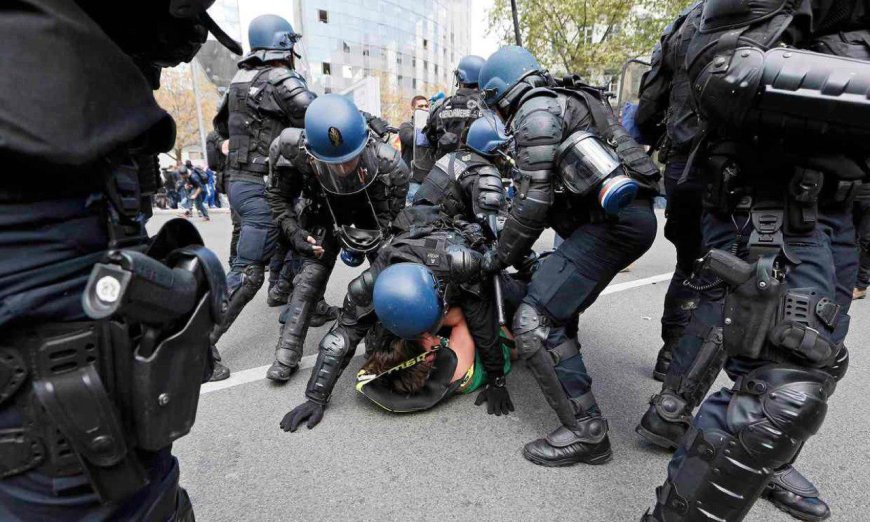Bastille 2: When the Revolution Starts Behind Bars
The recent coordinated attacks on French prisons—from Agen to Tarascon—are far more than isolated acts of vandalism. They reflect a profound crisis within France’s social and security fabric.

“Bastille 2: When the Revolution Starts Behind Bars”
The recent coordinated attacks on French prisons—from Agen to Tarascon—are far more than isolated acts of vandalism. They reflect a profound crisis within France’s social and security fabric. These systematic attacks on correctional facilities, erupting rapidly across various regions, have laid bare deep vulnerabilities in the country's security infrastructure and exposed growing social tensions that the government seems increasingly incapable of addressing. More worryingly, these attacks point to the existence of widespread and deeply entrenched internal security threats in France, hinting at a web of coordinated operations targeting state institutions. The pattern of events is anything but random; it rather suggests a broader insurgency by organized groups’ intent on undermining public order and challenging the authority of the French state. The highly targeted nature of these assaults—spanning multiple regions and aiming at high-security facilities—indicates deliberate planning, far beyond the scale of local protests. This alarming coordination raises the possibility that France is now facing a larger, more disruptive network that sees the prison system as a symbolic battleground in a wider fight against state control and entrenched power.
Critics have long argued that these events underscore severe deficiencies in the French security services' threat prevention and crisis management. Despite numerous warnings and clear signs of domestic unrest, the government’s response has remained reactive rather than preventive. The repeated breaches of supposedly secure facilities reveal that current security and surveillance systems are struggling to keep pace with evolving threats—failures possibly rooted in a lack of cooperation between government agencies and policymakers, which may be fueling further instability and systemic dysfunction. Even the Justice Ministry's swift statements, vowing not to back down from legal enforcement, have failed to convince the public of the government’s seriousness. Meanwhile, reports of police brutality during the suppression of recent protests have further eroded public trust. The excessive use of force against both demonstrators and detainees points to a punitive approach that endangers lives and deepens societal grievances, intensifying a vicious cycle of tension and confrontation. Furthermore, the lack of transparency in legal proceedings for those arrested during protests has become a rallying cry for critics of the French state. The vulnerability of prison staff, highlighted by attacks on their private vehicles at their homes, underlines the government's broader failure to protect its own personnel. This situation signals a deeper crisis in France's approach to public security and employee protection. The government's apparent inability to prevent these predictable, coordinated assaults exposes either a massive intelligence failure or a disturbing shortage of necessary resources and preparedness. These security incidents must also be examined within the broader context of social and political dissatisfaction. Many of these attacks are not isolated acts but symptoms of a deeply rooted desperation among segments of the population. Critics point out the government’s chronic failure to address the socio-economic factors fueling discontent. Particularly, the protests have been exacerbated by the perceived impunity granted to detainees linked to these upheavals, creating an environment where criminals and suspects are viewed through a lens that questions the legitimacy and fairness of the entire judicial system. Protesters’ anger is not merely a demand for accountability; it is a rejection of a status quo that has long marginalized specific social groups.
Moreover, media narratives are increasingly highlighting the broader dangers of organized threats against state institutions. Analysts warn that if these patterns persist unchecked, France may face long-term national security risks. The danger lies not only in the possibility of isolated attacks snowballing into a continuous insurgency but also in the likelihood that these events reflect a sprawling network exploiting systemic weaknesses. The convergence of internal security threats, public frustration, and instances of police violence all point to a fundamental failure of governance—one that inadequately addresses the material and psychological foundations of unrest in modern France. Ultimately, the wave of prison attacks in recent days signals a multifaceted crisis that goes far beyond isolated acts of sabotage or arson. It exposes deep security vulnerabilities, failures in proactive threat management, ineffective government responses, and a corroded public trust in law enforcement and the judicial system. The targeting of major state institutions, coupled with documented police violence and dissatisfaction over the lack of due process for detainees, calls into question the very foundation of France’s security apparatus. These events must be recognized as symptoms of a larger breakdown—one that not only disrupts social security but also demands a fundamental reevaluation of France’s view on crime and the rights of the accused. By challenging entrenched narratives and insisting on deeper structural reforms, these developments are pushing France to reassess the balance between state authority and individual rights—this time, without the luxury of whitewashing the truth.













































